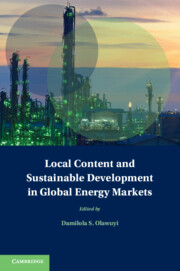Refine search
Actions for selected content:
2 results
7 - Community Policing After the Uprisings
-
- Book:
- Creating Consent in an Illiberal Order
- Published online:
- 02 June 2022
- Print publication:
- 09 June 2022, pp 175-198
-
- Chapter
- Export citation

Local Content and Sustainable Development in Global Energy Markets
-
- Published online:
- 05 March 2021
- Print publication:
- 04 March 2021
